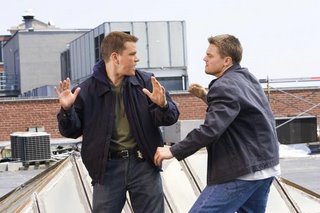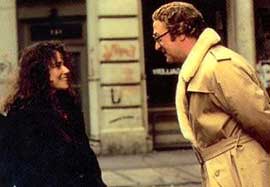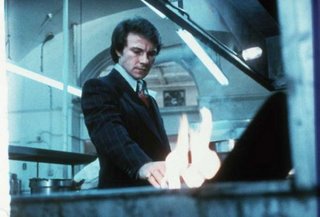the departed

fair warning: there are spoilers ahead. i will not dance around the plot twists, so don't read any further if you don't want to know about the movie.
bodies bodies bodies! scorsese has been known in the past to be a filmmaker very in touch with morality. for all the violence we see in his films, there's always something to temper it -- catholic guilt, self-medication, poetic justice. this film seemed to struggle with that. sure, matt damon gets his at the end, but then there's that jokey final shot. and does damon's death really balance out the extreme nihilism that came before it, mostly in the famous elevator scene? costello's death hardly resonates, even though he is a man who has "made his environment". the only death we really feel for is the floating body of martin sheen.
and with all that death, i couldn't help but wonder, like damon said to his lady: "what about the baby?" even though she features mostly as a cipher, i found vera farmiga's character a lot more interesting than some of the main charcters.
so i'll say this much about "the departed": its a mixed-bag. first, the bad. this movie is not especially well-written. for example, the plot machinations are mostly worthless -- not a minor point for what some are saying is a major work. microchips? who gives a fuck? gangster text-messaging each other? about as unsexy as you can get. and the editing was crazy. i know marty and thelma did this on purpose, especially in the first 20 minutes or so, using it as experiment in sustaining long-form parallel narratives and keeping a tension between keeping the audience off-balance and stringing them along, but it didn't much work for me. finally, the soundtrack was fucked. gratutious use of "gimme shelter", which showed scorsese hand in his intention of riffing on old themes. the dropkick murphys was cliched and strangely mixed, and the trend that scorsese popularized of keeping rock playing at all times in the background seemed inorganic this time.
all right, the good. the casting is excellent, using many boston-area movie stars who have a feel for the setting. and scorsese isn't generally considered an actor's director, but you can tell he gives his actors extreme range to play. for instance, i've always thought alec baldwin isn't always used as well as he should be, and here he is almost exclusively used comedically, which is as it should be. martin sheen does his usual dependable job, and has a great last line that's endearing and charming, and moments later, becomes sad as we realize how much we liked him. mark wahlberg continues to grow as an actor, and his scene-chewing here is funny, intense and just right. matt damon does solid work, making smart choices on when to be vulnerable and weary and when to let loose. and leonardo dicaprio is fine again, showing that for as much of a movie star as he has become, he still acts his ass off. his worry about being pulled too far into the mob is palpable and he shows how much it tears at him. sometimes he screams about it, sometimes he shows it quietly, but each choice resonates. and then there's jack nicholson's costello. nicholson hams it up here, sure, but i believed it. his introduction, all in shadows, sets up a character who is larger than life, and who better to play that than jack? he eats his scenes alive and includes little bits of business that show a sense of playfulness that is priceless. witness how he shakes down dicaprio then tells him, more than once, "eat something." i loved it. in short, scorsese gives movie stars room to be movie stars, and that's something we don't see enough of these days.
and i loved a lot of little details, including the variety of accents, parallels between irish mobsters and the italian boys scorsese normally portrays, and the ways the men all subtly shudder at the gunshots being fired during dicaprio's funeral.
in the end, though, this film won't hold up too well. its mostly an excuse for scorsese to get back to some of his old tics and riffing on past successes while fucking around with the form some (i.e., using so much formal composition, using irises). in short, its scorsese trying his best to have fun again, and to one-up those who he has influenced (tarantino and kitano in particular, but also "the sopranos" and hong kong action films as well). that's fine and not something i can give him guff for, but it still leaves a little bit more to be desired.


